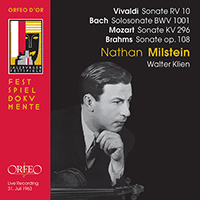Walter Klien
Son of a well-known artist, Erika Giovanna Klien, Walter Klien began playing the piano at the age of five. He first studied piano, composition and conducting in Frankfurt, then Graz. In 1946 he began studies with Josef Dichler at the Vienna Academy of Music and completed his piano studies with Arturo Benedetti Michelangeli. Klien also took lessons in composition from Paul Hindemith. During the early 1950s Klien participated in competitions, winning prizes at both the 1951 and 1952 Busoni Competitions in Bolzano.
By the time of his debuts in Britain and America, Klien was already known through his recordings. His London debut in February 1968, made in the Purcell Room, the smallest of the three concert halls on the South Bank, was a great success. ‘The Purcell Room can rarely have heard a finer recital than that given on Friday by the Austrian pianist Walter Klien.’ The critic of The Times went as far as to say, ‘Everything he played was marked by extreme refinement, profound intelligence, and near-perfect clarity—sustained by an impressive technique.’
During the 1960s and 1970s Klien toured the world playing in North and South America, Europe, the Far East, the Soviet Union and at most of the major musical festivals. In 1972 Rudolf Serkin made him a faculty member of the Marlboro Music Festival in Vermont. Klien worked with violinists Wolfgang Schneiderhan and Edith Peinemann and singers Julius Patzak, Hans Hotter and Hermann Prey. Klien’s style was one of coolness and precision with a clarity of technique. As Donald Manildi described him, ‘Tonally and technically he left little to be desired, and the quiet authority of his approach did not preclude ample vitality and wit where needed.’ His repertoire was based around the Austro-German Classical works for which he became famous, but he also played twentieth-century music. From the mid-1960s he recorded for the American label Vox, and most of these recordings appeared on the Turnabout label in Britain. He was the first pianist to record the complete solo piano music of Brahms, and he also recorded the complete piano sonatas of Mozart for which he received the Wiener Flötenuhr Prize in 1969. Ten years later, in June 1979, Klien finished his recording of the complete piano sonatas of Schubert. He did not, however, attempt to complete the unfinished sonatas: ‘You do not write third and fourth movements for the C major. I studied composition and I wrote symphonies and operas but I would not like to finish a Schubert sonata.’ With fellow Vox artist Alfred Brendel, Klien recorded duets by Dvořák, Brahms and Mozart, but he never seemed to attain the public adulation that Brendel received. Also for Vox, Klien recorded major works by Schumann, some Haydn piano sonatas, and a selection of Grieg including the Ballade Op. 24. There are not many concerto recordings, but one Vox disc includes Stravinsky’s Concerto for Piano and Wind and Concertinos by Janáček and Honegger.
With Schneiderhan Klein recorded such works as Richard Strauss’s Violin Sonata and music by Schubert and Dvořák. In the early 1980s he recorded Mozart’s sonatas for violin and piano with Arthur Grumiaux for Philips.
© Naxos Rights International Ltd. — Jonathan Summers (A–Z of Pianists, Naxos 8.558107–10).

















